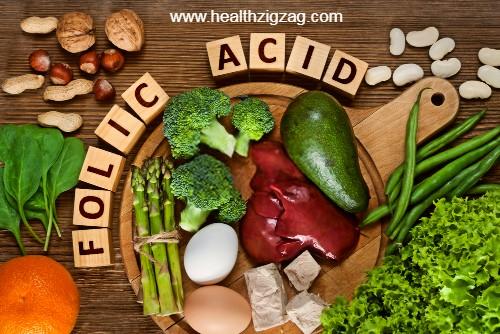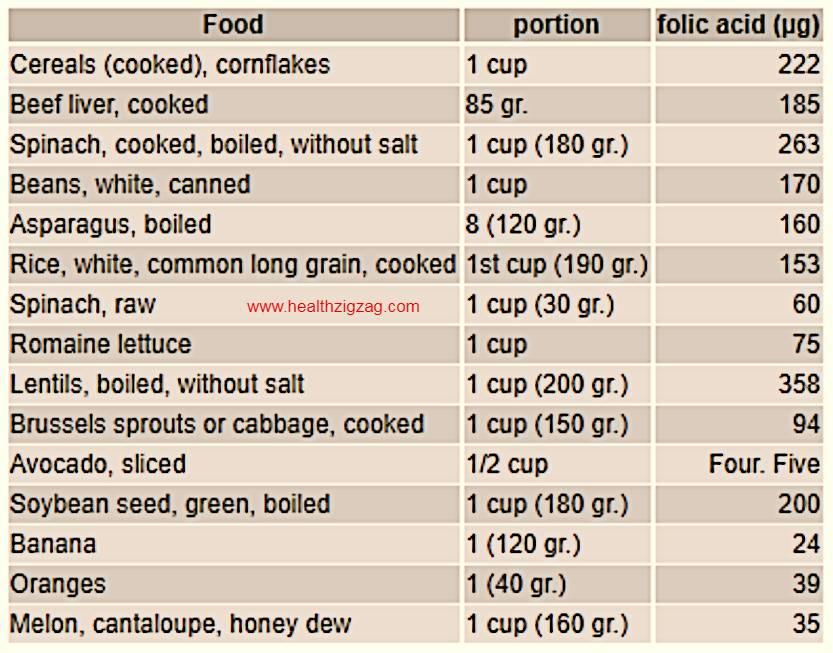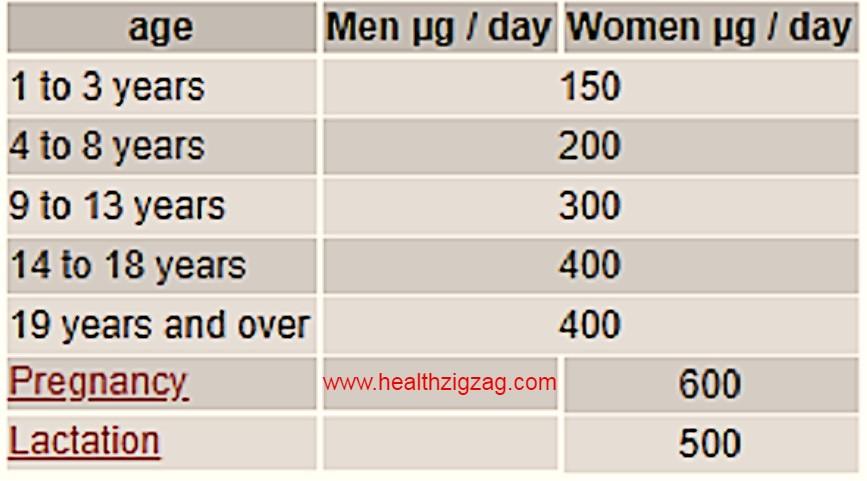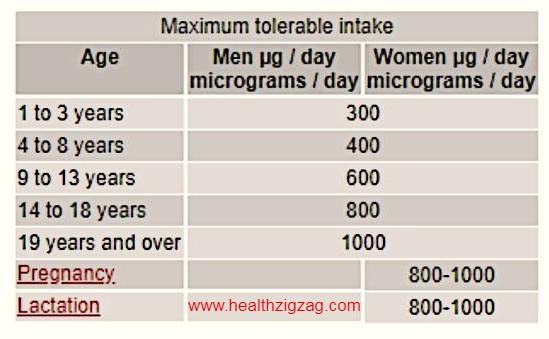
Contents [show]
Folic Acid, formerly known as vitamin B9, this compound is important for the proper formation of blood cells. It is a component of some enzymes necessary for the formation of red blood cells. Their presence keeps the skin healthy and prevents anemia. Its presence is closely related to that of vitamin B12.
Folic acid can be obtained from
- Meats (goat, beef, pork, etc.)
- From the liver
- Dark green vegetables (spinach, asparagus, radicchio, etc.)
- Whole grains (wheat, rice, corn, etc.)
- Potatoes
Its lack causes anemias, digestive and intestinal disorders, redness of the tongue and greater vulnerability to injuries.
This acid administered to patients affected by macrocytic anemia, leukemia, stomatitis, and cancer.
The excesses do not seem to show adverse effects, and given its appearance given its water solubility, its excess is eliminated by the urinary tract.
You May Like Also:
- Vitamin B Foods Which Are Important For Your Health
- Vitamin C: Benefits, Sources, Deficiencies, and Overdose
- What do you need to know about vitamin A?
- Vitamin K: Description, Food Sources, Deficiency, Precautions, Interactions
Extended definition:
Discovered in the 40s, folic acid considered a water-soluble vitamin that belongs to the B complex. Also known as folacin or folates whose etymology comes from the Latin ‘folium’ which means leaf.
This vitamin is essential to carry out all the functions of our body. Its great importance is that folic acid is essential at the cellular level to synthesize DNA (deoxyribonucleic acid). Which transmits genetic characters, and also to synthesize RNA (ribonucleic acid), essential to form body tissue, proteins, and other processes cells.
Therefore the existence of folic acid in our body is important for proper duplication and cell division.
Folates work in combination with vitamin C and vitamin B12 in the use of proteins. It is essential to note that folic acid is basic for the development of the heme group (part of the hemoglobin that contains iron ). So it is related to the formation of red blood cells.
Folic acid also provides benefits to the cardiovascular system, nervous system, and fetal neurological formation among others. Given its great importance for humans, many of the foods we consume today have folic acid added.
This acid is formed in the intestine from our intestinal flora. It is mainly absorbed in the small intestine, then distributed in the tissues through the bloodstream and stored in the liver. It is excreted in urine and feces.
Functions of folic acid (vitamin B9)
- Acts as a coenzyme in the transfer process of mono carbon groups,
- It is involved in the synthesis of purines and pyrimidines, therefore it participates in the metabolism of RNA, DNA, and proteins.
- It is necessary for the formation of blood cells, more specifically red blood cells,
- Reduces the risk of neural tube defects of the fetus such as spina bifida and anencephaly,
- Decreases the occurrence of cardiovascular diseases,
- It prevents some types of cancer,
- It helps increase appetite,
- Stimulates the formation of digestive acids.
Sources of folic acid
- Sources of animal origin: it is present at very low levels in the animal kingdom. We find it in the liver of veal and chicken, in milk and its derivatives.
- Sources of plant origin: the plant kingdom is rich in this vitamin. The highest concentrations are found in legumes (lentils, soybeans), whole grains and their derivatives, green leafy vegetables (spinach, cabbage, lettuce, asparagus), wheat germ, and fruits (melon, bananas, oranges, and avocado.)
- Supplements: folic acid tablets should always be taken under medical supervision and in situations where the doctor indicates.
With food handling, more than half of the natural folic acid content can be lost or destroyed. It is destroyed with prolonged cooking in abundant water, with the reheating of meals and also with the storage of food at room temperature.
Then it will always be convenient to eat raw all those foods that allow it, brief cooking (steamed) and store them in the fridge.
The following table mentions the number of micrograms (mcg) of vitamin B9 or folic acid present in a portion of food.

Folic acid or vitamin B9 deficiency
Folic acid shortage can manifest itself through the following symptoms:
- megaloblastic anemia
- low weight, lack of appetite
- weakness, paleness, fatigue
- sickness
- diarrhea
- bad mood, depression
- inflammation and tongue sores, mouth ulcers
- tachycardias
- growth retardation
- gray hair
The best way to meet the daily needs of this vitamin is through a balanced diet that includes all food groups. But there are situations where folic acid supplements may be needed, such as:
- Women of childbearing age, pregnant or breastfeeding: an adequate amount of this is essential for women of childbearing age. As it prevents neural tube defects of the fetus, including spina bifida and anencephaly. All those women who take folic acid supplements before conception reduce the risk of neurological defects in the future baby by 50%.
- Elderly: from 65 years of age the vitamin absorption capacity is clearly diminished.
- Smoking people: tobacco use hinders the absorption and availability of B vitamins.
- Alcoholic people: alcohol decreases and hinders the absorption of vitamins.
- Crohn’s disease, ulcerative colitis, etc: diseases with frequent and diarrheal evacuations, prevent a good absorption of this vitamin.
- continued use of certain drugs: how to be oral contraceptives, anti-inflammatories, sedatives, sleeping pills, etc.
There are certain medications that interfere with folate metabolism by decreasing its absorption. Among them are:
- Nonsteroidal anti-inflammatory drugs (NSAIDs): as aspirin or ibuprofen in high daily doses,
- anticonvulsants/antiepileptics: such as phenytoin and phenobarbital,
- lipid-lowering agents: those that lower cholesterol levels such as cholestyramine and colestipol,
- methotrexate: used to treat rheumatoid arthritis, psoriasis and certain types of cancer,
- antihyperglycemic agents: such as buformin, fenformin and metformin,
- oral contraceptives,
- diuretics: as triamterene used in high blood pressure,
- Antibiotics: such as trimethoprim and pyrimethamine.
Taking supplements in all these circumstances named above should always be supervised by a health professional.
Recommended daily doses of folic acid or vitamin B9
The following table establishes the recommended daily intake of vitamin B9 or folic acid according to the Department of Nutrition of the IOM (Institute of Medicine) and USDA (United States Department of Agriculture) for infants, children, and adults.

Due to insufficient information regarding the recommended dose of folates for infants, adequate intake has been established based on the amount of folate consumed by healthy infants and fed through breast milk. This is 60 micrograms daily until 6 months and 80 until 12 months of age.
Toxicity – Consequences of excessive folic acid intake
The risk of toxicity with folic acid intake from food as well as supplements is low. Being a water-soluble vitamin, all extra intake removed through the urine.
There is also an indication that certain patients taking anticonvulsant medications may experience seizures at high levels of folic acid.

As a reference, tolerable maximum intake levels (tolerable upper intake levels: UL) established to prevent the risk of toxicity with vitamin B9 or folic acid. Contrary effects increased at intakes greater than the maximum tolerable level. An intake greater than the maximum established may bring symptoms of vitamin B12 deficiency (nerve degeneration and masking of anemias) due to the interaction between them.
Recommendations
Folate present in animal products such as beef liver is relatively stable before cooking. However, the folate content of vegetable products can be lost by up to 40% during cooking as well as during storage at room temperature for long periods of time.
It is advisable to include and comply with the daily doses of vitamin B-1, B-2 and B-3 so that they favor the natural metabolism of folic acid. Published By Healthzigzag.com




